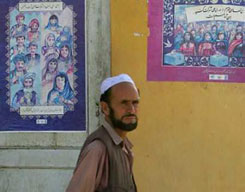|
Taliban kill 16 Afghans carrying voter cards
(Agencies)
Updated: 2004-06-28 10:57
Taliban guerrillas kidnapped and killed 16 people in an Afghan province after finding them with voter registration cards for the country's September elections, officials said Sunday.
The killings Friday night in the province of Zabul were the most serious attack yet on the elections, which the Taliban and allied Islamic militants have vowed to disrupt.

An Afghan man walks past posters promoting the election in Kabul June 27, 2004. Taliban guerrillas kidnapped and then killed 16 people in an Afghan province after finding them with voter registration cards for the country's September elections, officials said on Sunday. [Reuters] |
News of the violence came a day after a bomb killed two young women, one a student, working to register voters for the U.N.-Afghan electoral body in the eastern city of Jalalabad.
The violence brought fresh calls for NATO members to make good on pledges to protect the polls at a two-day summit in Istanbul from Monday.
Haji Obaidullah, chief of Khas Uruzgan district in the central province of Uruzgan, said the guerrillas stopped a bus carrying 17 male civilians Friday.
They took them to Dai Chopan district of neighboring Zabul and killed all but one, he quoted the lone survivor as saying. "They were apparently killed because they were carrying the registration cards," he said.
A spokesman for the United Nations said he was aware of reports of the incident and these were under investigation.
Uruzgan police chief Roozi Khan said several hundred U.S. and Afghan soldiers backed by air support were searching for the villagers' bodies and the attackers.
"We have been told that the group involved in this incident has hidden in Deh Rawud district of Uruzgan," he told Reuters.
The Taliban claimed responsibility for killing the women by bombing their bus in Jalalabad Saturday. It said the guerrillas had warned Afghans not to become involved in elections that would only strengthen the U.S.-backed government.
Its spokesman Abdul Latif Hakimi said the guerrillas had killed 19 people kidnapped in Uruzgan Friday but none were civilians. "Six of them belonged to the elections commission and 13 were government soldiers," he said.
MORE TROOPS?
An upsurge in militant violence in the run-up to the polls has raised doubts as to whether they can be held on time, but the U.N. Special Representative to Afghanistan Jean Arnault said attacks like that in Jalalabad would not slow the process.
"The best way to pay tribute to the two women killed is to re-dedicate ourselves to this process," a U.N. spokesman quoted him as saying while visiting relatives of the victims Sunday.
However, U.N. spokesman Manoel de Almeida e Silva said the attack showed the need to improve election security and repeated a call to NATO members to provide the necessary troops.
In Istanbul, NATO is to announce that its 6,400-strong peacekeeping force will take command of more reconstruction teams in the north and deploy around 1,500 troops for the polls.
But this will fall short of the at least 5,000 extra troops the government and the United Nations say are needed, and the deployments will be to relatively secure areas, not to the south and east where militants are most active.
Ahead of the summit, which Afghan President Hamid Karzai will attend, NATO Secretary-General Jaap de Hoop Scheffer warned against Western indifference to insecurity in Afghanistan.
"The international community in its entirety, not just NATO, cannot allow itself to see Afghanistan return to being a safe haven for terrorism," he told Italy's Il Sole 24 Ore daily.
The latest attacks are further setbacks for U.S.-led efforts to bring peace to Afghanistan, a country U.S. President Bush has described as a role model for Iraq.
Analysts say Bush has been pushing for September polls in Afghanistan so he has a foreign policy success to balance against Iraq before his own re-election bid in November.
More than five million of nearly 10 million voters eligible have registered, but the process has been slowed in the south and east by militant threats and violence.
Women's registration has lagged, due to conservative Islamic values and problems recruiting female poll workers, and movements of female staff have been restricted in the south and east as a precaution since the Jalalabad attack.
Registration was supposed to be completed by the end of June but the U.N. spokesman said it would be extended in some areas to allow a maximum of people to qualify for the polls.
|